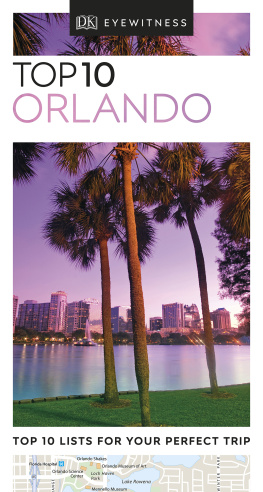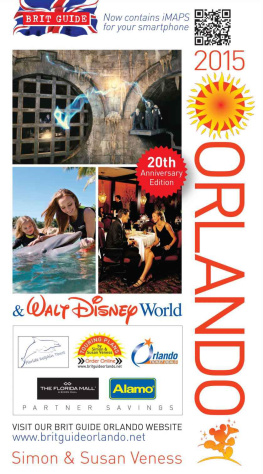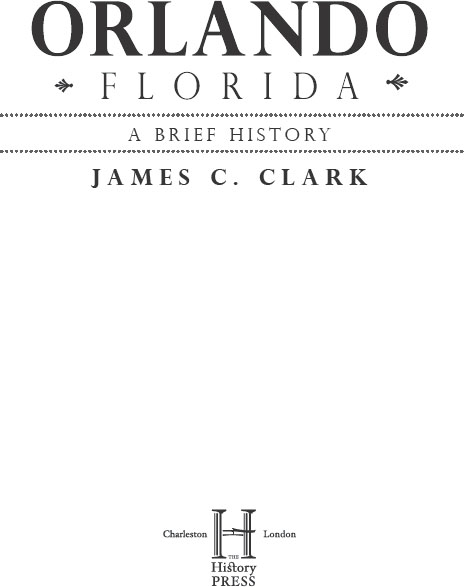
Published by The History Press
Charleston, SC 29403
www.historypress.net
Copyright 2013 by James Clark
All rights reserved
Front cover, top: Courtesy of Harvey Smith of Downtown Orlando Incorporated.
Front cover, bottom: Courtesy of the Historical Society of Central Florida, Incorporated.
First published 2013
e-book edition 2013
ISBN 978.1.62584.662.4
Library of Congress CIP data applied for.
print edition ISBN 978.1.62619.194.5
Notice: The information in this book is true and complete to the best of our knowledge. It is offered without guarantee on the part of the author or The History Press. The author and The History Press disclaim all liability in connection with the use of this book.
All rights reserved. No part of this book may be reproduced or transmitted in any form whatsoever without prior written permission from the publisher except in the case of brief quotations embodied in critical articles and reviews.
To my colleagues in the University of Central Florida History Department who have helped and encouraged me at every step.
CONTENTS
PREFACE AND ACKNOWLEDGEMENTS
For hundreds of millions of people around the world, Orlando is the home of Walt Disney World; Universal Studios Florida; Sea World; and other attractions. Nearby is the Kennedy Space Center, and east or west there are beautiful beaches.
Few know its rich history from the Indian raids of the 1800s, to the era of the cowboy and the cattle drives, to the center of the citrus industry.
In writing this book, I have been able to draw on a lengthy list of people whose research, writings and preservation of Orlando history made this book possible.
There is Dr. Jerrell Shofner, the former chair of the University of Central Florida History Department, who conducted detailed research into local history throughout Florida. It is frightening to think what historical research in Orlando would be without Sara Van Arsdel, the director of the Orange County Regional History Center. Her battle for the regional history center is legendary. Cynthia Cardona Melndez, the centers curator, has devoted her career to saving the history of Orlando and, at the same time, provided invaluable assistance to me.
The Orlando Sentinel has an unusual commitment to Orlando history dating to the 1970s. The newspaper has run regular history columns written by a series of writers, including Jim Robison, Mark Andrews and Joy Dickinson, who have developed a following and produced several excellent books of Orlando history.
There are others whose work in Florida history has been vital. David Colburn of the University of Florida, Robert Cassanello of the University of Central Florida and Ben Brotemarkle of the Florida Historical Society have made significant contributions to Florida history.
Jon Findell of the University of Central Floridas Faculty Media Center was, as always, a great friend and helped make this book possible. Adam Watson of the Florida State Archives provided invaluable assistance as he has done so often in the past. Working with Chad Rhoad and Darcy Mahan at The History Press was truly enjoyable, and I am grateful for their patience.
The Orlando Sentinel and its various predecessors were invaluable reference sources.
I am also grateful for the help of Trish Wingerson, Frank Billingsley, Sandra Varry and Grant Heston for coming to my rescue time after time.
Without these people and resources, this book would not have been possible, and I am grateful.
Chapter 1
THE FIRST SETTLERS
For thousands of years, Florida lay beneath the sea, and as the waters receded, limestone remained. Most of the land was at or near sea levelOrlando is about one hundred feet above sea level. The first inhabitants were camels, bears, wolves and saber-toothed tigers. They fled south to avoid the approaching ice agethe first creatures to come to Florida seeking warmth. North of Orlando archaeologists found the fossils of those animals.
The first humans came to Florida more than ten thousand years ago, long after the prehistoric animals disappeared. They arrived in the Orlando area about nine thousand years ago, settling along Lake Apopka. Archaeologists discovered dugout canoes on the lake banks buried in muck. New arrivals six thousand years ago brought pottery-making skills and planted crops.
When the first European settlers arrived in the 1500s, there were nearly half a million Native Americans in the peninsula including the Apalachee, Tekesta, Calusa, Ai, Acuera and Timucuan tribes. The Timucuan and the Acuera lived closest to Orlando and sold corn to Hernando de Soto in 1539. Some of the Indians died in battles with the Spanish, but the biggest killers were diseases that the Europeans brought and spread to the Indians who had no immunity. The Indians died by the thousands. The original Indian tribes disappeared, replaced by newer arrivals, such as the Seminoles.
The first European to see Orlando was probably Pedro Menendez de Aviles, who landed in St. Augustine in 1565. A year later, he traveled up the St. Johns River and then into the Orlando area, camping at Lake Eola.
Florida remained a Spanish possession until it passed to England as a spoil of the French and Indian War in 1763. The British handed it back to the Spanish in 1783 as a result of the American Revolution. Spain went from a world power to a third-rate power and could no longer control Florida. Indians and others used Florida as a haven to strike into Georgia. Slaves from Georgia escaped into Florida, and pirates used its harbors without fear.
In 1821, facing the threat that the United States would take Florida, Spain agreed to sell it. Florida became a state in 1845, although there were many, like Senator John Randolph of Virginia, who said, No man would immigrate into Floridaa land of swamps, of quagmires, or frogs and alligators and mosquitoes.
No one can say for sure where the name Orlando came from. There are a number of stories, and it may be that the mysterious origins of the name will never be known.
The most popular account is that the city is named for Orlando Reeves, thought to be a hero who gave his life in the wars with the Indians. The United States fought a series of wars with the Seminole Indians in the 1800s, and according to the legend, Orlando Reeves was an army soldier chasing the Seminoles in 1835. One night, the men camped at Lake Eolaoriginally called Sandy Beachin what is now downtown Orlando.
Reeves was on patrol when he saw something suspicious in the lakeit looked like a log that had not been there a few minutes earlier. He realized that the log was an Indian penetrating the camps defenses. As he sounded the alarm, an arrow struck and killed him. The soldiers and the Indians fought a battle, and eventually, the Indians faded back into the woods.
After the battle, the soldiers buried Reeves nearby on the banks of Lake Lawsona. He was wrapped in a blanket, and buried beneath a tall pine tree with his name carved on a tree. The carver, identified as a friend, supposedly carved Orlando Reeves, but all that could be seen in later years was Orlando Res.
With the last name impossible to read, the spot became known as Orlandos grave, and eventually the city took the name. So strong was the belief in the legend of Orlando Reeves that, in 1939, students at Cherokee Junior High Schoollocated between Lake Eola and Lake Lawsonaplaced a stone marker near Lake Eola.
ORLANDO REEVES
In Whose Honor our City of Orlando Was Named
Killed in This Vicinity by Indians September, 1835
Next page
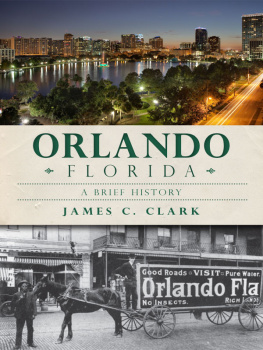

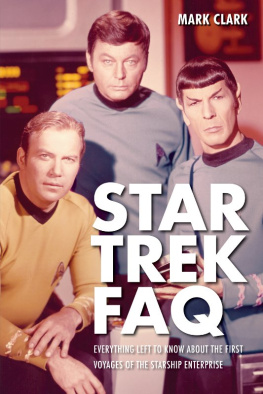
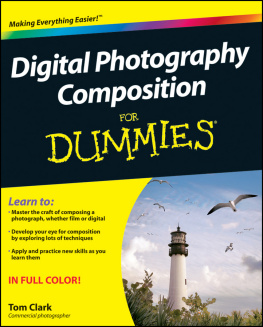


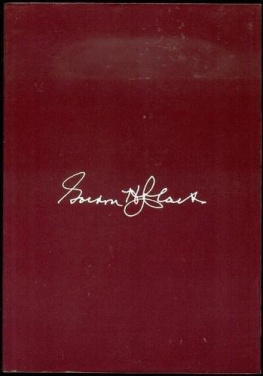
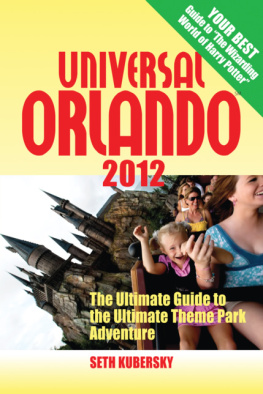
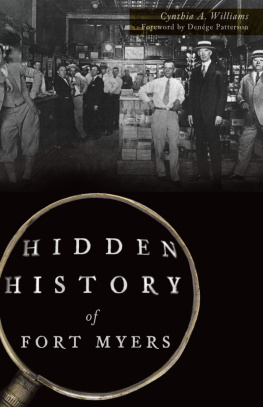

![Laura Lea Miller - Frommers Walt Disney World & Orlando with kids [2010]](/uploads/posts/book/213893/thumbs/laura-lea-miller-frommer-s-walt-disney-world.jpg)
